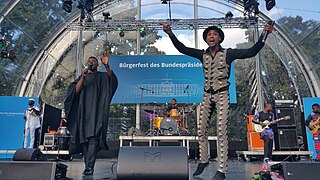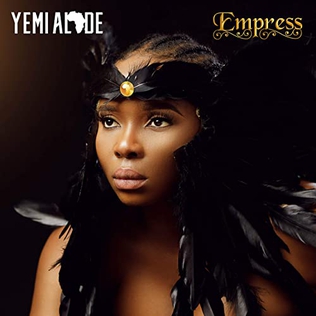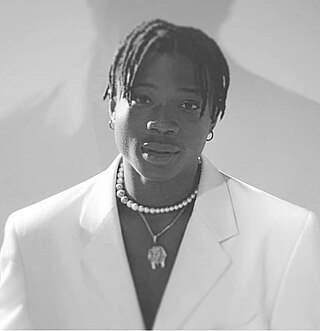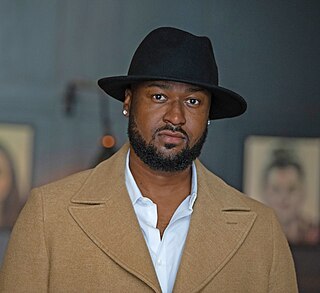
Afrobeat is a Nigerian music genre that involves the combination of West African musical styles from mainly Nigeria such as the traditional Yoruba and Igbo music and highlife with American funk, jazz, and soul influences. With a focus on chanted vocals, complex intersecting rhythms, and percussion. The style was pioneered in the 1960s by Nigerian multi-instrumentalist and bandleader Fela Kuti, who is most known for popularizing the style both within and outside Nigeria. At the height of his popularity, he was referred to as one of Africa's most "challenging and charismatic music performers."

The music of Nigeria includes many kinds of folk and popular music. Little of the country's music history prior to European contact has been preserved, although bronze carvings dating back to the 16th and 17th centuries have been found depicting musicians and their instruments. The country's most internationally renowned genres are Indigenous, Apala, Aurrebbe music, Rara music, Were music, Ogene, Fuji, Jùjú, Afrobeat, Afrobeats, Igbo highlife, Afro-juju, Waka, Igbo rap, Gospel, and Yo-pop. Styles of folk music are related to the over 250 ethnic groups in the country, each with their own techniques, instruments, and songs. The largest ethnic groups are the Igbo, Hausa and Yoruba. Traditional music from Nigeria and throughout Africa is often functional; in other words, it is performed to mark a ritual such as the wedding or funeral and not to achieve artistic goals. Although some Nigerians, especially children and the elderly, play instruments for their own amusement, solo performance is otherwise rare. Music is closely linked to agriculture, and there are restrictions on, for example, which instruments can be played during different parts of the planting season.

Tony Oladipo Allen was a Nigerian and French drummer, composer, and songwriter who lived and worked in Paris, France. Allen was the drummer and musical director of Fela Kuti's band Africa '70 from 1968 to 1979, and was one of the founders of the Afrobeat genre. Fela once stated that "without Tony Allen, there would be no Afrobeat". He was described by Brian Eno as "perhaps the greatest drummer who has ever lived".
Afro rock is a style of rock music with African influences. Afro rock is a dynamic interplay between Western rock music and African musical elements such as rhythm, melodies and instrumentation. Afro rock bands and artists in the late 1960s and early 1970s included Osibisa, Assagai and Lafayette Afro Rock Band.

Sorrow Tears and Blood is an album by Nigerian Afrobeat composer, bandleader, and multi-instrumentalist Fela Kuti. It was recorded in 1977 and originally released on the Nigerian Kalakuta label.
Igbo highlife is a contemporary musical genre which combines highlife and Igbo traditional music. It first started off in the southeast region of Nigeria, during the 1920s. The genre is primarily guitar-based music, with a rare characteristic blend of horns and vocal rhythms. Igbo highlife lyrics are sung mostly in Igbo with occasional infusion of Pidgin English. One of the most influential composers and performers of the music is Chief Stephen Osita Osadebe whose career spanned over 40 years. Osadebe's discography comprises numerous popular songs including the 1984 hit "Osondi Owendi" which launched him on the world stage as a pioneer of the Igbo highlife genre.
Abiodun Odukoya, better known as Abiodun, is a Nigerian-German singer, songwriter, producer and music arranger. Abiodun's name is of Yoruba origin and means "he who is born on a day of festivity". He is better known as the co founder of the Afro German music collective Brothers Keepers and as one of the pioneers of the German reggae, afro and soul music scene.

Bantu is a 13-piece band based in Lagos, Nigeria. Their music is a fusion of Afrofunk, Afrobeat, highlife and Yoruba music. The group features multi-instrumentalists and singers who perform as a collective.

No Man Stands Alone is Bantu's fourth studio album. It is features collaborations and duets by Ade Bantu and mostly Nigerian artists The only international feature is Ghanaian musician Wanlov The Kubolor on the Afrobeat inspired track "Travel & Sea"."I'm Waiting" a duet with Nigerian Songstress Nneka was released as the official soundtrack of Andy Amadi Okoroafor's movie Relentless starring Nneka and Gideon Okeke 84 year old legendary Highlife musician Fatai Rolling Dollar is credited as a guitarist and vocalist on "Ni Bo L’anlo".

Agberos International is the 5th studio album by BANTU. The album was composed and written by all 13 members of the band. It was recorded live in Lagos, Nigeria, over six years. The title of the album Agberos International was inspired by Lagos public bus conductors known as agberos who attract customers to board their vehicles through their wild gesticulations and loud voices. The album was released on 7 July 2017 by Soledad Productions. The subject matter on Agberos International is centered around the Niger Delta crisis, oppressive Western policies and the blind African ruling class.
Afrobeats is an umbrella term to describe popular music from West Africa and the diaspora that initially developed in Nigeria, Ghana, and the UK in the 2000s and 2010s. Afrobeats is less of a style per se, and more of a descriptor for the fusion of sounds flowing majorly out of Nigeria. Genres such as hiplife, jùjú music, highlife and naija beats, among others, were amalgamated under the "Afrobeats" umbrella.
Amapiano, a Nguni word loosely translated to "the pianos", is a subgenre of kwaito and house music that emerged in South Africa in the mid-2010s. It is a hybrid of deep house, jazz, and lounge music characterized by synths and wide, percussive basslines.

Empress is the fifth studio album by Yemi Alade. It was released through her label Effyzzie Music Group on 20 November 2020. It features guest appearances from French singers Dadju and Vegedream; her colleagues from Nigeria, Patoranking and Rudeboy; British Grammy-winning singer Estelle; and Mzansi Youth Choir from South Africa. It is an afrobeat record with 15 tracks that incorporates elements of gospel music, couple decale, soul, pop, dancehall and highlife; all afro.

Everybody Get Agenda is the sixth studio album by Bantu, released on September 23, 2020, on Soledad Productions. Like their previous album Agberos International, this long player was composed and written by all members of the band. It was recorded in Lagos, Nigeria and mixed in Cologne, Germany. The music style is Afrofunk and Afrobeat with elements of Yoruba music, Soul, Jazz and Rap.

Ọmọ́rìnmádé Kútì known professionally as Made Kuti, is a Nigerian afrobeat singer, songwriter and instrumentalist. He released his debut album titled For(e)ward in 2021.
Omary Ally Mwanga, known professionally as Marioo, is a Tanzanian singer, songwriter, and music producer. He is known for his hits such as Bia Tamu, Mama Amina, Dear Ex, Raha, Mi Amor and Naogopa, songs that have made him a household name in Tanzania.

Timeless is the fourth studio album by Nigerian singer Davido. It was released on March 31, 2023, through Davido Music Worldwide, Columbia Records, and Sony Music Entertainment. Primarily an amapiano record, the album explores other musical styles such as afrobeats, dancehall, ragga, konto, highlife, and afropop. Timeless comprises 17 tracks and features collaborations with Skepta, Angelique Kidjo, Asake, Focalistic, and The Cavemen, among others. Its production was handled by Magicsticks, Ragee, Darmie, Blaisebeatz, 1da Banton, Caltonic SA, and Young Alpha, among others. The album was supported by the singles "Champion Sound" and "Unavailable". Timeless received generally positive reviews from music critics, who praised its production and considered it to be one of Davido's most accomplished albums yet. In July 2023, Davido embarked on the Timeless North American Tour to support the album.

Michael Chimeruche Alozie, known professionally as Snazzy the Optimist or simply Snazzy, is a Nigerian-born singer, songwriter and rapper. An alumnus of International College of Creative Arts, he began as a rapper, covering songs and began his music career professionally in 2021.

Charles Onyekachi Onyeabor is an Italian-Nigerian singer, songwriter and businessman. He is the eldest son of electro Afro-funk pioneer William Onyeabor. After debuting in 2020, his debut studio album, Like Father, Like Son was released in November 2023. As described by BBC, Charles Onyeabor continues to keep his father's legacy alive in his music.













